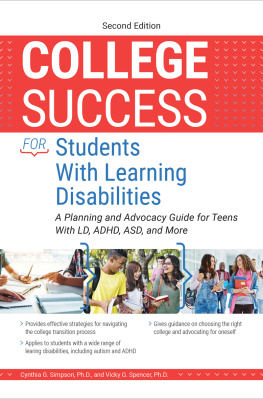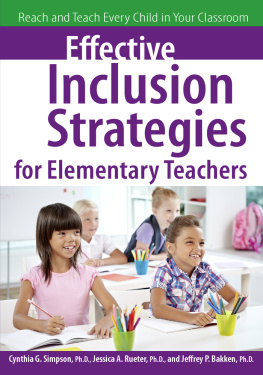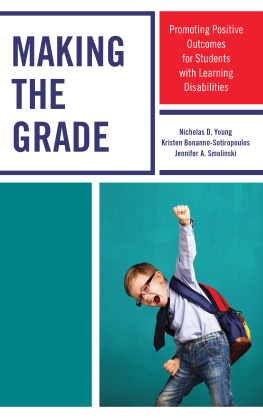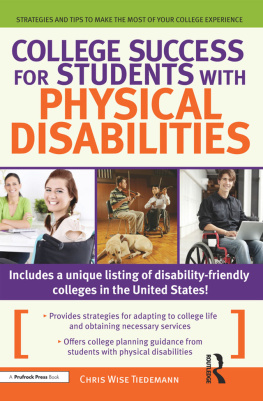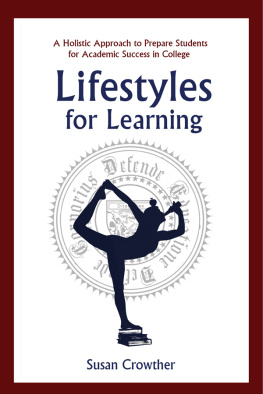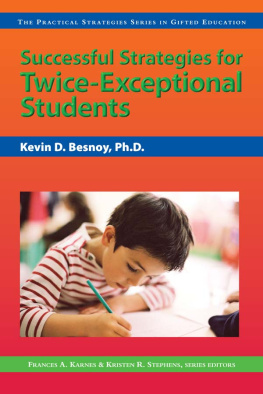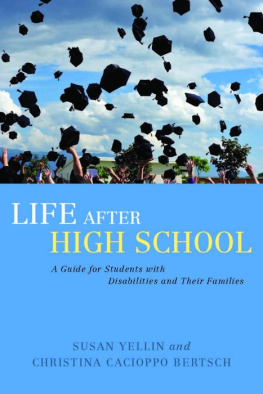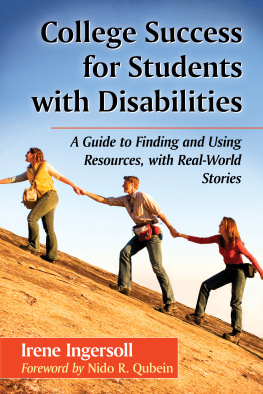Cynthia Simpson - College Success for Students With Learning Disabilities
Here you can read online Cynthia Simpson - College Success for Students With Learning Disabilities full text of the book (entire story) in english for free. Download pdf and epub, get meaning, cover and reviews about this ebook. publisher: Sourcebooks, genre: Home and family. Description of the work, (preface) as well as reviews are available. Best literature library LitArk.com created for fans of good reading and offers a wide selection of genres:
Romance novel
Science fiction
Adventure
Detective
Science
History
Home and family
Prose
Art
Politics
Computer
Non-fiction
Religion
Business
Children
Humor
Choose a favorite category and find really read worthwhile books. Enjoy immersion in the world of imagination, feel the emotions of the characters or learn something new for yourself, make an fascinating discovery.
- Book:College Success for Students With Learning Disabilities
- Author:
- Publisher:Sourcebooks
- Genre:
- Rating:3 / 5
- Favourites:Add to favourites
- Your mark:
- 60
- 1
- 2
- 3
- 4
- 5
College Success for Students With Learning Disabilities: summary, description and annotation
We offer to read an annotation, description, summary or preface (depends on what the author of the book "College Success for Students With Learning Disabilities" wrote himself). If you haven't found the necessary information about the book — write in the comments, we will try to find it.
Cynthia Simpson: author's other books
Who wrote College Success for Students With Learning Disabilities? Find out the surname, the name of the author of the book and a list of all author's works by series.
College Success for Students With Learning Disabilities — read online for free the complete book (whole text) full work
Below is the text of the book, divided by pages. System saving the place of the last page read, allows you to conveniently read the book "College Success for Students With Learning Disabilities" online for free, without having to search again every time where you left off. Put a bookmark, and you can go to the page where you finished reading at any time.
Font size:
Interval:
Bookmark:



Library of Congress Cataloging-in-Publication Data
Names: Simpson, Cynthia G., author. | Spencer, Vicky G., author.
Title: College success for students with learning disabilities : a planning and advocacy guide for teens with LD, ADHD, ASD, and more / Cynthia G. Simpson, Ph.D., and Vicky G. Spencer, Ph.D.
Description: Second edition. | Waco, TX : Prufrock Press Inc., [2020] |Includes bibliographical references. | Summary: College Success for Students With Learning Disabilities (2nd ed.) offers students the knowledge, guidance, and strategies they need to effectively choose a college, prepare for university life, and make the most of their collegiate experience-- Provided by publisher.
Identifiers: LCCN 2020027488 (print) | LCCN 2020027489 (ebook) | ISBN 9781646320455 (paperback) | ISBN 9781646320462 (ebook) | ISBN 9781646320479 (epub)
Subjects: LCSH: Learning disabled--Education (Higher)--United States--Handbooks, manuals, etc. | College student orientation--United States--Handbooks, manuals, etc.
Classification: LCC LC4818.38 .S56 2020 (print) | LCC LC4818.38 (ebook) |DDC 371.91--dc23
LC record available at https://lccn.loc.gov/2020027488
LC ebook record available at https://lccn.loc.gov/2020027489
Copyright 2020, Prufrock Press Inc.
Edited by Stephanie McCauley
Cover design by Allegra Denbo and layout design by Shelby Charette
ISBN-13: 978-1-64632-047-9
No part of this book may be reproduced, translated, stored in a retrieval system, or transmitted, in any form or by any means, electronic, mechanical, photocopying, microfilming, recording, or otherwise, without written permission from the publisher.
For more information about our copyright policy or to request reprint permissions, visit https://www.prufrock.com/permissions.aspx.
At the time of this books publication, all facts and figures cited are the most current available. All telephone numbers, addresses, and website URLs are accurate and active. All publications, organizations, websites, and other resources exist as described in the book, and all have been verified. The authors and Prufrock Press Inc. make no warranty or guarantee concerning the information and materials given out by organizations or content found at websites, and we are not responsible for any changes that occur after this books publication. If you find an error, please contact Prufrock Press Inc.
| Prufrock Press Inc. |
We would like to dedicate this book to those individuals with disabilities who have chosen to follow the college dream and to those individuals who may not have realized that college was a possibility. May you find yourselves examining this opportunity and reaching your full academic potential.
We also would like to dedicate this book to our families. Our husbands and children have provided us with love, support, and continued words of encouragement. We could not have done it without you. Thank you!
There are many people who have contributed to the process of writing this book. First and foremost, we would like to thank James Williams, Jared Romeo, Ricky Adams, and Angela Corbin for allowing us to share their stories about attending college as students with disabilities. Their words will allow others to realize their own potential and seek the services they need to be successful college students. We also would like to thank Rickys parents, as well as Mark and his parents (whose names have been changed for privacy reasons), for sharing their experiences that show the differing perspectives that family members have in regard to the college success of students with disabilities. In addition, we would like to thank our colleagues, who have supported us through the writing process and encouraged us to move forward with our own dreams, including Nancy Taylor, M.S., a transition job coach, who verified the accuracy of the federal transition guidelines presented throughout the book. Special thanks to the student chapters of Council for Exceptional Children and Best Buddies International for their work with students with disabilities and their efforts in facilitating peer friendships during the high school years and welcoming college students with disabilities into their organizations and onto the college campus.
The high school years are an exciting time for you and your family as you begin to make plans for the future: Will I get a job? Will I go to college? Where will I live? Will I have friends? These are just a few of the questions that you must face, but the answers may not always be easily accessible if you have been identified as a student with special needs. Most high schools have career centers that provide students with a wealth of information on topics such as college information sessions, financial aid, scholarships, and required testing. In addition, an overwhelming amount of college-related mail is distributed to students throughout their high school years. Unfortunately, the information received does not specifically address students with disabilities or even what services are offered to help mediate the college planning process.
This book serves as a resource for you, your parents, teachers, and other professionals who will assist in the development of a strategic process that can be individualized for students with learning disabilities (LD), along with other disabilities, such as Attention Deficit/Hyperactivity Disorder (ADHD) and autism spectrum disorders (ASD), who are transitioning from high school to college (also referred to as postsecondary education). When we refer to college or university, these terms also include trade schools, technical schools, community colleges, and junior colleges.
In the previous edition of this book, Aspergers syndrome was specifically referred to as a standalone disability. In the fifth edition of the Diagnostic and Statistical Manual of Mental Disorders (DSM-5), Aspergers syndrome was no longer included (American Psychiatric Association, 2013). The definition of ASD now encompasses a continuum of mild to severe. In addition, Social Communication Disorder has been recognized in the DSM-5.
Throughout this book, we often use the word disabilities or disability in lieu of identifying a specific disability. Although the content of the book is geared toward students identified with disabilities, including students with anxiety disorders, current practices within the public school system and within the field of special education have led educators to identify students in two groups: those accessing the general education curriculum and those accessing an adapted curriculum. Keeping this in mind, note that the suggestions offered throughout this book relating to college success could apply not only to those students currently served under the Individuals With Disabilities Education Act (IDEA), but also those who receive adaptations to the general curriculum under a civil rights law. Section 504 of the Rehabilitation Act of 1973 is a civil rights law that prohibits discrimination based on disability. This law applies to public elementary and secondary schools, and institutions of higher education, although the law is not limited to just educational institutions. Section 504 is not part of special education. However, it is a formal plan developed to ensure that a student who has a disability identified under the law and is attending an elementary or secondary educational institution receives supports and accommodations that will increase their academic success and access to the learning environment.
Next pageFont size:
Interval:
Bookmark:
Similar books «College Success for Students With Learning Disabilities»
Look at similar books to College Success for Students With Learning Disabilities. We have selected literature similar in name and meaning in the hope of providing readers with more options to find new, interesting, not yet read works.
Discussion, reviews of the book College Success for Students With Learning Disabilities and just readers' own opinions. Leave your comments, write what you think about the work, its meaning or the main characters. Specify what exactly you liked and what you didn't like, and why you think so.

